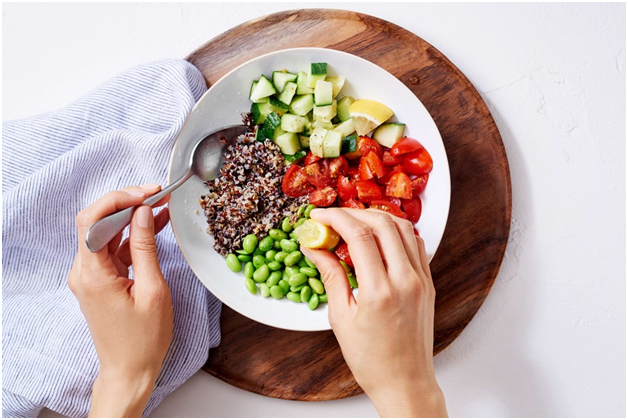When considering living a healthy lifestyle, fats are necessary for having good general health. This is even more important as a person becomes older. Therefore it is vital to realize that the body requires regular ingestion of fats.

Eating good quantities of dietary fat is important as they supply calories which the body employs for energy, help support cell development as well as shield and keep the body organs warm.
Your body similarly require dietary fat to help it properly absorb vitamins that include D, E, A, and K as well as to produce essential hormones. Consuming the right kind of dietary fats and in the correct quantity assists to keep blood pressure in order.
Having said that, it’s likewise crucial to know that whatever you consume can impact your LDL “bad” cholesterol levels. Getting to grips with which kind of dietary fats will raise your LDL (bad) cholesterol and also the kinds which don’t, is essential. This knowledge might help to reduce your risk of stroke as well as heart disease.
Also, some dietary fats are great providers of alpha-linolenic acid and linoleic acid – two very vital fatty acids.
It is hence important to realize that trying to eliminate fats from your dietmight just deny the body of one of its most fundamental source of nourishment.
The Various Kinds of Fats
Fat is a complex topic which encourages lots of argument between scientists and nutrition experts. Fact is that there is not only one particular “fat” but instead there are different types of fats.
It’s worth understanding the influence fats have in a nutritious diet regime. So, it is good to examine the four different kinds of fats: polyunsaturated fats, saturated fats, monounsaturated fats, and trans fats.
You can find fats both in animal and plant foods. The reality is that every single fat is made up of a combination of monounsaturated, saturated, and polyunsaturated fatty acids, in diverse amounts. Additionally, oils are usually unsaturated fatty acids, although they include little amounts of saturated fatty acids.
The four (4) types possess various chemical buil ups as well as physical qualities. The fact is that some of these dietary fats are good, a number of others bad or good – based on certain factors, even though some are extremely evil.
The dangerous fats – saturated and trans fats – are generally strong at room temperature. On the other hand, the polyunsaturated fats and monounsaturated fats tend to be more liquefied.
Regardless of their type, each gram of fat possesses nine (9) calories. Dietary fats are by nature a lot more calorie packed compared with protein and carbohydrate foods which possess 4 calories per gram.
Saturated fatty acids
These fats are usually viewed as the “bad” fats. Their chemical make up has no double bonds between carbon molecules mainly because they are saturated with hydrogen molecules.
They occur naturally a lot of food items and are typically sourced from dairy and meat products. The meat sources include things like poultry (with the skin on), beef, lamb, and pork. The dairy options of saturated fatty acids include high-fat dairy foods like margarine, cream, cheese and butter.
The plant-based options of saturated fat include things like coconut oil, coconut, and cocoa butter. Some others include palm kernel oil and palm oil which are generally referred to as tropical oils. However, tropical oils generally tend not to have cholesterol.
Additionally, sources of saturated fats comprise of numerous fast, processed and baked food items including hamburgers, cookies, pastries, deserts, and pizza.
Monounsaturated Fats
In chemical terminology, monounsaturated fatty acids are simply fat molecules which possess one unsaturated carbon bond in the molecule. They are typically liquid at room temperature however begin to become solid whenever cooled. A typical example of monounsaturated fat is olive oil.
Oils containing increased amounts of monounsaturated fatty acids similarly have vitamin E – an antioxidant. Foods which possess high amounts of monounsaturated fatty acids are oils from plants including canola oil, olive oil, peanut oil, safflower oil and sesame oil.
Other good sources of monounsaturated fatty acids include avocados and also nut products like hazelnuts, pecans, almonds, and cashew. Monounsaturated fatty acids are likewise present in plant seeds including sunflower, pumpkin, and sesame.
Polyunsaturated Fatty Acids
Polyunsaturated fats have more than one unsaturated carbon bonds. Just like the monounsaturated fats, they’re also liquid at room temperature and turn solid when chilled.
Polyunsaturated fatty acids are found in great quantities in cottonseed, corn, sunflower, and soybean oils. Some other decent sources include sunflower, walnut, pumpkin, sesame, flax seeds, and pine nuts.
Having said that, it is really worth remembering that animal fats include just modest amounts of polyunsaturated fatty acids. Seafood including trout, tuna, salmon, herring, and mackerel possess substantial quantities of a kind of polyunsaturated fatty acids known as omega-3 fatty acids.
Trans fatty acids
Trans fatty acids are found mostly in oils made by means of an industrial method which adds hydrogen to liquid vegetable oils to try to make the vegetable oils much more solid. They are chemically different from the unsaturated fatty acids and differ on the impact they have on your body.
Trans fats can be found mostly in highly refined foods, including stir fried foods, pizza dough, pie crust, pastries, and also some other baked products. Some others are refined foods such as muffins, crackers, biscuits and even many makes of microwave popcorn.
Being Mindful of Fats
The principal wellness concern regarding fat consumption is the influence they have on blood cholesterol level. Also, there are serious worries about the elevated associated risk of inflammation which ingesting saturated fats and trans fats could trigger in the body.
Saturated fats and trans fats in food result in a much greater boost in LDL cholesterol levels. However, ingesting healthy fatty foods out of the polyunsaturated and monounsaturated fats might aid to stabilize blood cholesterol by means of decreasing LDL “bad” Cholesterol while boosting the HDL Cholesterol.
Eating dietary fats is unquestionably a component of a nutritious diet. The actual strategy should really be to select foodstuffs that supply nutritious fats. There should equally be a target to keep a caloric balance between the amounts of calories you consume from foods with the amount of calories you burn.
Discover even more about the approaches through which you can realize this by checking out https://www.lizino.net/weight-loss-tips-general-info/

